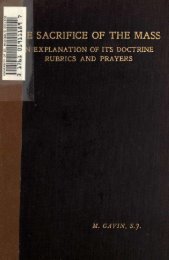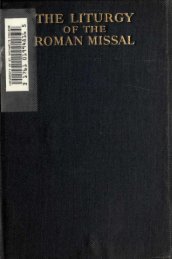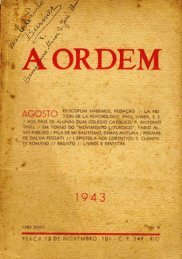E SACRIFICE OF THE MASS
E SACRIFICE OF THE MASS
E SACRIFICE OF THE MASS
You also want an ePaper? Increase the reach of your titles
YUMPU automatically turns print PDFs into web optimized ePapers that Google loves.
i go<br />
APPENDIX.<br />
7<br />
answer of the Hoi) Inquisition on March 26th, 1611,<br />
as given in Le Brim. ii. (Vol. p. 241, with addition xiv.<br />
Paris, 1726.)<br />
Feria quinta die 26 Martii,<br />
1611. In generali Congregatione<br />
Sanctse Romance, et universalis<br />
Inquisitionis habita in Palatio<br />
Apostolico apud Sanctum Petrum<br />
coram Sanctissimo Domino<br />
nostro Paulo V. ... Item permisit<br />
Sanctitas sua iisdem<br />
Patribus, ut possint transferre<br />
sacra Biblia in Linguam Sin-<br />
arum, non tamen vulgarem, sed<br />
eruditam et litteratorum pro-<br />
in eadem lingua Sinarum possint<br />
a Sinis celebrari divina officia<br />
Missarum et Horarum Canonicarum.<br />
Denique permisit ut in<br />
eadem lingua erudita Sinarum,<br />
possint a Sinis Sacramenta ministrari,<br />
et aliae Ecclesiae functiones<br />
peragi.<br />
In a General Congregation of<br />
the Holy Roman and Universal<br />
Inquisition held in the Apostolic<br />
Palace at St. Peter s in the pres<br />
ence of our most holy Lord<br />
Paul V. ... His Holiness like<br />
wise gave leave to the Fathers to<br />
translate the holy books of the<br />
Bible into the Chinese language,<br />
not into the language of the<br />
people, but into the learned<br />
language distinctive of educated<br />
men, and to make use of these<br />
books thus translated ; at the<br />
same time (Paul V.) commands<br />
priam, illisque sic translates uti,<br />
et simul mandat ut in translatione<br />
Bibliorum, adhibeant summam<br />
et exquisitam diligentiam, that in the translation of the<br />
et translatio fidelissima sit, ac Bible the Fathers show every<br />
conceivable care and that the<br />
translation be most faithful, and<br />
he gives leave for the Divine<br />
service of the Mass and of the<br />
Canonical Hours to be said by<br />
the Chinese missionaries in the<br />
same Chinese language. Finally,<br />
he gave leave for the Sacraments<br />
and other Ecclesiastical rites to<br />
be administered by Chinese<br />
missionaries in the same classical<br />
Chinese language.<br />
The Holy Office in reply drew a distinction between<br />
the popular Chinese (lingua vulgaris) as now spoken by<br />
that people and the Chinese spoken by the learned<br />
and literary class. Leave was given to the Jesuit<br />
missionaries to translate Bible and liturgy into the<br />
latter (eruditam et littevatovum propriam), not into the<br />
former (noti tamen vulgarem).<br />
A Chinese scholar explains






